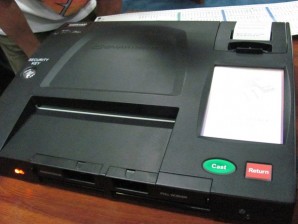Senators demand Comelec probe of PCOS incidents
MANILA, Philippines—Senators in the joint oversight committee on the automated election system asked the Commission on Elections (Comelec) on Thursday to conduct an investigation of certain incidents in the 2013 election where the precinct count optical scam (PCOS) machines apparently inaccurately counted the votes cast.
Lawyer Glenn Chong presented at the committee’s hearing on Thursday a copy of a ballot from Lapu-lapu that showed that the voter had only voted for only four candidates, but the PCOS machine counted 12 votes.
Comelec Chair Sixto Brillantes agreed to conduct the study, after admitting that this could happen, but contended that the number of such incidents was not enough to affect the results of the election.
Brillantes attributed the problem to the ink used which he said could cause marks that the machines counted as votes, or to one of the components of the machines.
He said the poll body was already addressing the matter and would resolve it before the 2016 elections.
Article continues after this advertisementHe also said the Comelec was checking for such incidents in the areas where there are electoral protests and where the ballots are opened.
Article continues after this advertisementBut Sen. Alan Peter Cayetano said he was concerned that this meant the automated election system was not reliable.
Cayetano said that since the Comelec had not conducted a random, scientific audit of the 2013 elections, there was no basis for it to claim that the system was reliable and this supposed glitch had not affected the integrity of the polls in the entire country.
The glitch could have happened in areas where there have been no electoral protests, he said.
“The whole point of going automated is [so] we can assure our people that 100 percent there is no dagdag bawas (vote shaving) here. I’m not saying intentional vote shaving,” Cayetano said.
“I want certainty by the time we pass the budget that the system is reliable,” he added.
